douglas aircraft
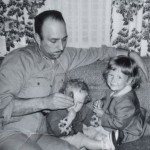
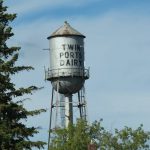 I’m sure that everyone has heard the little jokes people make to tease someone about which parent they look like…or sometimes don’t. They might say something like, “You look like the milkman.” Of course, the indication is that the mother had an affair, but sometimes such a joke can backfire on the teller of the joke. When I say this, I am speaking from experience…not as an adult, but rather as a child. You see, my sister, Cheryl Masterson and I do look like the milk man…because the milkman was our dad. Of course our younger sisters do too, but he wasn’t a milk man when they were born.
I’m sure that everyone has heard the little jokes people make to tease someone about which parent they look like…or sometimes don’t. They might say something like, “You look like the milkman.” Of course, the indication is that the mother had an affair, but sometimes such a joke can backfire on the teller of the joke. When I say this, I am speaking from experience…not as an adult, but rather as a child. You see, my sister, Cheryl Masterson and I do look like the milk man…because the milkman was our dad. Of course our younger sisters do too, but he wasn’t a milk man when they were born.
During the early years of their marriage, my dad worked for a company called Twin Ports Dairy, in Superior, Wisconsin. Over the remaining years of his life, my dad held various other jobs, and the one I remember the best was when he was a welder, first for Fred Dewell company, and later for WOTCO. Both of these were in Casper, Wyoming. One of the ones that I found the most interesting was when he worked for Douglas Aircraft. This was before he was married, and before World War II. It was this job that qualified him to become the 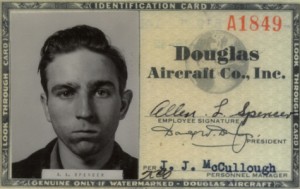 Flight Engineer on the B-17 Bomber. A man who worked building airplanes, would have a unique ability in that field. He also did work in the lumber yards and in the oil fields, prior to my parents marriage. In fact, he was working in the oil fields when he and my mother exchanged their wonderful love letters…which my sisters and I recently came across among their things. There are many parts to a man, and most men will do several types of work before settling on the one they will do for the rest of their life. My dad was no different, but in the end it would be the work that he did at the suggestion of his older brother, my Uncle Bill, that my dad would do the longest…welding. As World War II was progressing to the point of Americas necessary involvement, Uncle Bill was worried about his little brother, and he really hoped that his skill as a welder would keep my Dad on the home front, but it was his skill with airplanes that would win out in the end, and Dad would go to war…and thankfully come back home again.
Flight Engineer on the B-17 Bomber. A man who worked building airplanes, would have a unique ability in that field. He also did work in the lumber yards and in the oil fields, prior to my parents marriage. In fact, he was working in the oil fields when he and my mother exchanged their wonderful love letters…which my sisters and I recently came across among their things. There are many parts to a man, and most men will do several types of work before settling on the one they will do for the rest of their life. My dad was no different, but in the end it would be the work that he did at the suggestion of his older brother, my Uncle Bill, that my dad would do the longest…welding. As World War II was progressing to the point of Americas necessary involvement, Uncle Bill was worried about his little brother, and he really hoped that his skill as a welder would keep my Dad on the home front, but it was his skill with airplanes that would win out in the end, and Dad would go to war…and thankfully come back home again.
All those parts of my dad…along with his deep love of family would make him into the person we all knew and dearly loved, but I think for my mom, its possible that the Milkman job was a personal favorite. After all, it kept 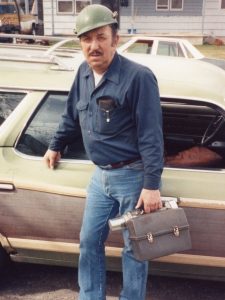
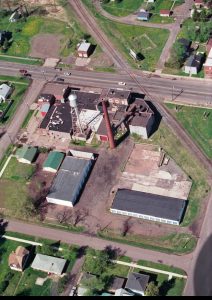 him close to home, and it was a safe job for her husband and the father of her children. I think it was her favorite, because of all the times I have heard her talk about that one, and I can relate to the part about keeping him home, because sometimes when he had to go out of town for work in the years after we moved to Casper, I simply didn’t feel good until he came home. I don’t mean sad…I mean I felt physically ill until he came home. My sisters and I loved our daddy very much, and we wanted him to be at home. In fact, I still wish he was at home…here on Earth, instead of in Heaven, because I miss him very much. Today would have been my dad’s 93rd birthday. Happy birthday in Heaven Dad. We all love and miss you very much, and can’t wait to see you and Mom again.
him close to home, and it was a safe job for her husband and the father of her children. I think it was her favorite, because of all the times I have heard her talk about that one, and I can relate to the part about keeping him home, because sometimes when he had to go out of town for work in the years after we moved to Casper, I simply didn’t feel good until he came home. I don’t mean sad…I mean I felt physically ill until he came home. My sisters and I loved our daddy very much, and we wanted him to be at home. In fact, I still wish he was at home…here on Earth, instead of in Heaven, because I miss him very much. Today would have been my dad’s 93rd birthday. Happy birthday in Heaven Dad. We all love and miss you very much, and can’t wait to see you and Mom again.
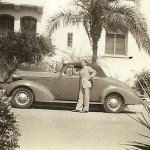 When my dad was a young man, he decided to leave the cold climate of Wisconsin, and move to sunny California to start a new life. He went to work for Douglas Aircraft, and he did very well there. He probably would have stayed there had World War II not intervened. I sometimes wonder how his life might have been different had he stayed there, or had he gone back there after the war. Would he have met my mom, and if so, would we have all lived in California. I can’t say that I am sorry that his life took the path that it did, because it made him the man who became my dad. His path shaped who he was and who we all became, and that is just fine with me. I don’t think I would have wanted to be anywhere else really, even though I sometimes wish I lived somewhere warm.
When my dad was a young man, he decided to leave the cold climate of Wisconsin, and move to sunny California to start a new life. He went to work for Douglas Aircraft, and he did very well there. He probably would have stayed there had World War II not intervened. I sometimes wonder how his life might have been different had he stayed there, or had he gone back there after the war. Would he have met my mom, and if so, would we have all lived in California. I can’t say that I am sorry that his life took the path that it did, because it made him the man who became my dad. His path shaped who he was and who we all became, and that is just fine with me. I don’t think I would have wanted to be anywhere else really, even though I sometimes wish I lived somewhere warm.
Nevertheless, as I look at some of the pictures of him at that time, a thought forms in my mind. My dad looks like a Hollywood Producer…or at least what I picture a Hollywood Producer looking like at that time in history. He is standing next to a modern automobile…at least it was then, and wearing a nice suit…much like I would expect a Hollywood Producer of that era to be wearing. I don’t know what event my dad was going to, or if he was just dressed up so he could get a good picture to show off his car, but I do know that he looked real classy. As I have looked through the old pictures my dad had, the pictures from California were very intriguing to me. California is probably the least like my dad’s personality of any state in the United States. He always liked the mountains and the rural areas of the country. That is something I agree with. I love the mountains, and I don’t like congested areas. So, what had drawn him to California?
It is rather strange for me to think of my dad living in California. It seems so out of character 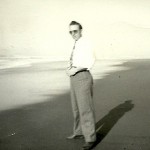 for him, except for the ocean and the Redwoods, both of which he always loved. Other than that, he never was the California type. Nevertheless, California might have been very different then, but I just don’t think it fit his personality. Still, he was a young man then, and I’m sure he was trying out new things, to see who he was and where he wanted to be. Nevertheless, I can’t imagine my dad doing anything but the work he did. During the years he was growing up, he and his brother liked to build things, so mechanical things were more their style, and that along with the welding he learned back then, were his life’s work. He definitely isn’t a Hollywood Producer type, but as they say, “He sure did clean up nice!”
for him, except for the ocean and the Redwoods, both of which he always loved. Other than that, he never was the California type. Nevertheless, California might have been very different then, but I just don’t think it fit his personality. Still, he was a young man then, and I’m sure he was trying out new things, to see who he was and where he wanted to be. Nevertheless, I can’t imagine my dad doing anything but the work he did. During the years he was growing up, he and his brother liked to build things, so mechanical things were more their style, and that along with the welding he learned back then, were his life’s work. He definitely isn’t a Hollywood Producer type, but as they say, “He sure did clean up nice!”
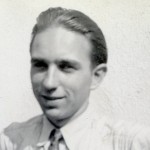 In 1938 to 1939, my dad moved from the family farm, into town so he could attend vocational school. He studied sheet metal fabrication. After he graduated, he moved to Santa Monica, California, at the very young age of just 17 years, and went to work for Douglas Aircraft. Uncle Bill, dad’s brother, let him take his 1934 Plymouth, which broke down on the way there, and Dad had to wire his dad for the money to fix it. It’s pretty had to fix a broken down car, when you are on the way to a new job. Most of us don’t have a lot of money at that point, and after the Great Depression, the country was just starting to come back. This job would begin to move my dad into a position for some of his future jobs, later in life, beginning with his military placement as a Flight Engineer. The Flight Engineer had to know everything about the plane, because it was his job to try to get them back to the base safely…even if something went wrong with the plane. There was no place to pull over when you are flying at 25,000 to 30,000 feet. There was at least one time I know of that Dad was the only reason they came back safely, because the landing gear would not go down. He had to hang upside down in the open bomb bay and crank it down by hand.
In 1938 to 1939, my dad moved from the family farm, into town so he could attend vocational school. He studied sheet metal fabrication. After he graduated, he moved to Santa Monica, California, at the very young age of just 17 years, and went to work for Douglas Aircraft. Uncle Bill, dad’s brother, let him take his 1934 Plymouth, which broke down on the way there, and Dad had to wire his dad for the money to fix it. It’s pretty had to fix a broken down car, when you are on the way to a new job. Most of us don’t have a lot of money at that point, and after the Great Depression, the country was just starting to come back. This job would begin to move my dad into a position for some of his future jobs, later in life, beginning with his military placement as a Flight Engineer. The Flight Engineer had to know everything about the plane, because it was his job to try to get them back to the base safely…even if something went wrong with the plane. There was no place to pull over when you are flying at 25,000 to 30,000 feet. There was at least one time I know of that Dad was the only reason they came back safely, because the landing gear would not go down. He had to hang upside down in the open bomb bay and crank it down by hand.
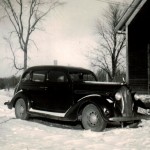
My dad was very good at the work he did for Douglas Aircraft, but on December 7, 1941, everything changed. Dad left California, in the 1936 Plymouth he had bought, and came home just as the United States was entering World War II. His plan, of course, was to join the Army Air Forces. He was a perfect match for the Army Air Forces, because of his knowledge of air craft, and they saw that right away. He was put into training, and placed on a B-17G crew, as the Flight Engineer, and stationed at Great Ashfield, Suffolk, England. His crew left Texas, and flew to New York City, on April 1, 1944, where they refueled and went on to England.
Most crews on B-17G planes had to fly 35 missions before they could come home, but at Great Ashfield, because of how dangerous that area was, they only had to fly 25. My dad ended up flying 26 before he came home. I don’t think his family knew how dangerous that base was, because my dad would not have told them. “The average life of a B-17 bomber at Great Ashfield was just over 4 months. Very few B-17 bombers that were transferred to the base lasted a complete tour of duty. The average Airman lasted 15 combat missions and few completed an entire tour of 25 missions. Much less 35 !!!! The average LIFE of a Ball Turret Gunner in combat was 12 MINUTES.” Knowing that my dad somehow beat those odds, reminds me of 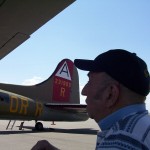 the many miracles in his life. His crew did lose at least one Ball Turret Gunner, and my dad tried everything he could to save his life, but it was no use…he was gone.
the many miracles in his life. His crew did lose at least one Ball Turret Gunner, and my dad tried everything he could to save his life, but it was no use…he was gone.
In later years, Dad would work for Fred Dewell, as a welder and sheet metal fabricator. His training at vocational school and Douglas Aircraft made him an asset to that company. Then Dad went to work for WATCO, building the boxes for Caterpillar trucks. He was one of their best welders, and was remembered by the people who worked there for many years after his retirement. His training as a young man of only 16 years, served him well all of his life, and I have always been very proud of the things he did in his lifetime.

